- There are no more items in your cart
- Shipping Calculated at checkout
-
Sub-Total (inc. VAT)
£0.00
- Single-component, fire-resistant acrylic paint available in white or 27 colours.
- Designed for use on loadbearing structural steel, including beams and columns.
- Provides up to 60 minutes of fire protection without requiring a primer or topcoat.
- Non-toxic, near zero VOC, and emission-free, making it safe for indoor environments.
- Durable and robust with an expected lifespan of at least 12 years.
- Tested to EN 13381-8:2013 and compliant with Indoor Air Comfort GOLD® and BREEAM standards.
High-Performance Fire Protection
Steel Paint FR-1 is a single-component, water-based acrylic coating engineered for up to 60 minutes of fire protection for structural steel. The advanced intumescent formula expands under heat, creating a robust insulating barrier that delays heat transfer to steel substrates. This allows structures to retain their loadbearing integrity for longer in the event of a fire.
Where It Can Be Used
This product is suitable for application on structural steelwork, including beams, columns, and hollow sections. It is designed for interior environments where fire resistance is required, such as commercial buildings, industrial facilities, and public infrastructure.
Application and Surface Preparation
- Ensure steel surfaces are clean, dry, and free from contaminants.
- Primers must be applied immediately to bare steel for corrosion protection.
- Compatible primers include Tikkurila Temaprime EUR, AkzoNobel Intercryl, and Sherwin-Williams epoxy primers.
- Can be applied by airless spray, brush, or roller.
- For best results, apply in thin layers with correct drying times to prevent cracking.
Drying and Curing Times
- Touch dry in approximately 1.5 to 3 hours, depending on temperature.
- Overcoating times vary based on conditions, requiring a minimum of 4 to 6 hours.
- Full curing achieved within weeks under normal conditions.
Limitations and Restrictions
- Not suitable for direct application onto galvanised steel or zinc-rich primers.
- Should not be applied in extremely humid or damp conditions.
- Not recommended for use on bituminous substrates or surfaces that may release plasticisers or solvents.
- A topcoat is required for environments classified above C2 according to BS-EN ISO 12944-2.
Health and Safety
- UN Number: Not classified as dangerous goods.
- Contains melamine, which is classified as a suspected carcinogen (H351) and may affect fertility (H361f).
- Restricted to professional users; not suitable for consumer use.
- Always wear protective gloves, clothing, and eye protection.
- Ensure adequate ventilation when applying.
- Refer to the safety data sheet for full handling precautions.
Important Notes
Always follow the manufacturer’s instructions and refer to the downloadable technical and safety data sheets for complete information. The performance and durability of the paint depend on proper application, drying conditions, and environmental exposure.
Data sheet
- Manufacturer
- Protecta
- Interior / Exterior Use
- Interior Use
- Water / Solvent Based
- Water
- For Use On
- Steel
- Application Method
- Brush, Roller, Spray
- Sheen
- Matt
- Colour
- Fully Tintable
- VOC Levels
- Ultra-Low (5-49 g/l)
- Single, Two or Three Pack
- Single
- Product Certifications
- BS-EN 13381-8:2013
- Pack Size
- 20L
- Max. Application Temperature
- 50°C
- Density
- Approx. h.43 kg/ltr
- Solids by Volume
- 72.6 % (ASTM D2369)
- Recommended Wet Film Thickness
- Spray applied at 1,500µ WFT (20 °C), brush applied at 500µ (20 °C)
- Dry to Recoat (at 23°C)
- 4 hours (400-750µ WFT)
- Touch Dry (at 23°C)
- 1.5 hours (400-750µ WFT)
- Base Type
- Water-Based
- Suitable For Use On
- Steel
- Finish
- Matt
- Application Method
- Brush
- Application Method
- Roller
- Application Method
- Spray
- Product Usage Type
- Basecoat & Topcoat
- Colour Family
- Cream
- Colour Family
- Beige
- Colour Family
- Grey
- Colour Family
- Pink
- Colour Family
- Yellow
- Colour Family
- Off-White
- Colour Family
- White
- Fire Rating
- 30 Minutes
- Fire Rating
- 60 Minutes
- Site Application
- On-Site
Questions
Question about the product
|
| Question:
Can it be used to fireproof steel clad building on petrochem facilities? If yes is there a minimum steel cladding thickness that is required? |
Answer from Rawlins’ Technical Team:
Unfortunately this product would not be suitable for the protection of thin gauge steel cladding. This is designed for load bearing structural steel only. | |
IMPORTANT SHIPPING & DELIVERY INFORMATION
Protecta Steel Paint FR-1 is only available with the shipping and delivery timescales listed below - please do not contact our Customer Support Team with enquiries about alternative or earlier shipping and delivery times.
Saturdays and Sundays, as well as Bank Holidays, are not classed as working days.
Orders placed after the cut-off for this product will not be processed for earliest dispatch until 9am the next working day.
All delivery costs below are excluding VAT
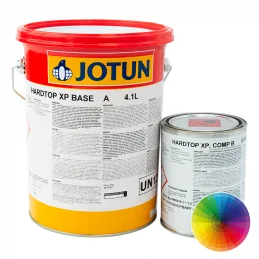
Jotun Hardtop XP
An on-site friendly, glossy polyurethane topcoat for most epoxy systems where a durable, weather-resistant finish is required in a wide range of aggressive atmospheres. Jotun Hardtop XP is one of the most popular polyurethane topcoats – protecting millions of square metres every year. Another Jotun paint that can be applied by airless spray,...
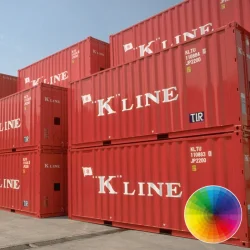
International Intercryl 525
International Intercryl 525 is designed for use as a primer/finish for structural steel, in a wide variety of general industrial environments of light to moderate corrosivity, including on bridges, commercial buildings, infrastructure and manufacturing plants. Excellent colour and gloss retention 4,800+ colours, inc. RAL, RAL Design &...
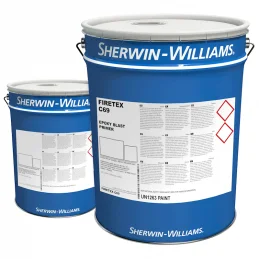
Sherwin-Williams FIRETEX C69
A two pack epoxy, fast-track blast primer for intumescent coatings. It is a fast-track temporary protective coating for surfaces prepared by abrasive blast cleaning, designed for use under Firetex intumescent coatings. Certificate Application
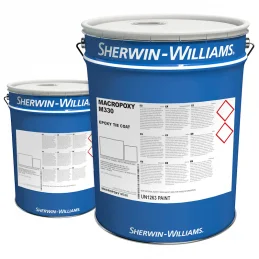
Sherwin-Williams Macropoxy M330
Sherwin-Williams Macropoxy M330 (formerly known as Epigrip M330) is a 2-pack epoxy sealercoat for use over zinc silicate and other types of zinc rich primers. It is also used as a blast primer for use over stainless steel. Please note: This product is made to order subject to a minimum order quantity of 150L and an extended lead time of 14...
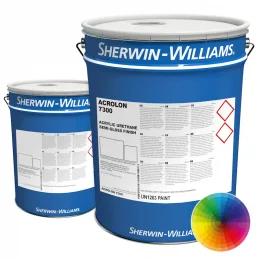
Sherwin-Williams Acrolon 7300
Sherwin-Williams Acrolon 7300 is a high solids, tin free polyurethane, with fast drying and high gloss attributes. Acrolon 7300 can suitable for use where long term exterior gloss and colour retention characteristics are required. Gloss levels: Gloss: 70%+ Semi-Gloss - approx. 40% Available in 450+ colours Professional use only -...
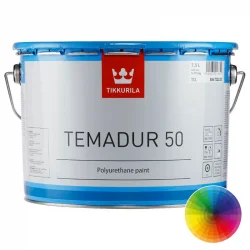
Tikkurila Temadur 50
Time-proven, easy-to-use general purpose topcoat in 4,000+ colours for constructional steelwork and machinery, with a wide range of colours to choose from. Two-component, durable and non-chalking semi-gloss polyurethane paint, hardener aliphatic isocyanate. Forms a durable, easy-to-clean and non-chalking topcoat with good gloss and colour...
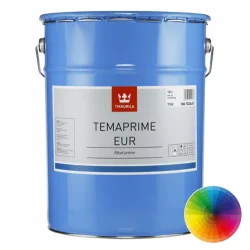
Tikkurila Temaprime EUR
Tikkurila Temaprime EUR is a fast-drying, one-component anti-corrosive economical alkyd primer. Recommended for steel structures, agricultural, construction and other machinery. Huge colour range available. An excellent choice for use in assembling plants and painting stations with rapid production cycles. The product has MED (Marine...
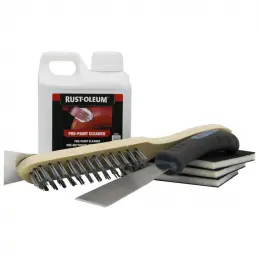
Surface Preparation Kits for Steel
These surface preparation kits for steel have been created to help provide customers with an easily accessible bundle of tools to aid in the preparation of steel surfaces in accordance with ISO 8501-1 (St2/3) and SSPC (SP 2/3). Please click here for important information about these kits. Kit Contents: SET 1 (Hand Tools) 1 x Rust-Oleum...



